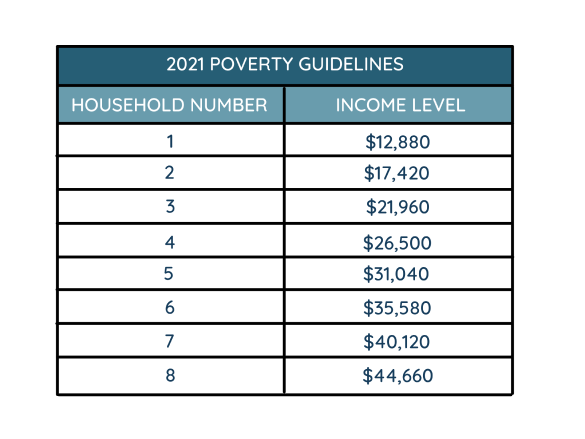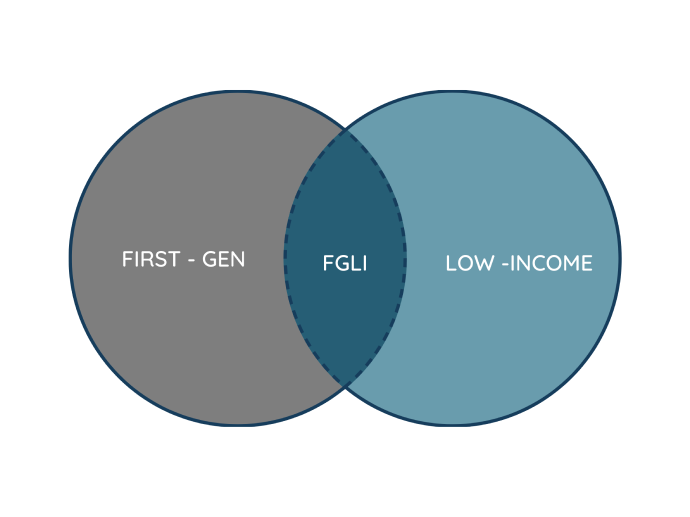Definitions and FAQ's
Am I a First-Generation College Student?
At Rise First, we recognize that the definition for first-generation and/or low-income (FGLI) students has many caveats and may vary across the country. Our team has leveraged our understanding, experiences and research to broadly define the terminology below so that the FGLI community has a common understanding. The definition is subject to change and may slightly differ by school and organization.
A first-generation (or "first-gen") college student is defined as an undergraduate whose parent(s)/legal guardian(s) did not earn a bachelor’s or higher degree in the US or any other country. First-gen students face unique challenges when attending universities, while also bringing diverse perspectives.
About 4.2MM students in the U.S. may be considered first-generation, low-income college students. (Source)
Only 9% of them will earn a bachelor’s degree by age 24, compared to 77% from high-income families. (Source)
Only 13% of college dropouts ever return , and even fewer graduate. Students who delay earning a degree also delay the earnings premium and workforce outcomes associated
with educational attainment. (Source)
That said, there is also a growing body of resources dedicated to helping first-generation college students, including scholarships, programs, events, and communities. It is important now, more than ever, for FGLI students to take steps to apply to college in order to reach their full potential and contribute to the diversity and thought leadership that will drive our economy and our society, but many first-gen students don’t know they are first-gen/identify that way until they get to college. Acknowledging the first-gen identity is the first step in getting the resources necessary to bridge the achievement gap of the FGLI community.
A low-income student comes from a household with an annual income that is in the lowest 20% nationwide (around $40,000) or below 200% of the federal poverty line. According to the US Office of The Assistant Secretary for Planning and Evaluation the poverty line per households is as follows: 1 person: $12,880; 2 people: $17,420; 3 people: $21,960; 4 people: $26,500; 5 people: $31,040; 6 people: $35,580; 7 people: $40,120; 8 people: $44,660. For households with more than 8 people, add $4,540 for each additional person. (Source)
Current household income status and thresholds may vary by state, county, and school, and can change over time. It’s important to speak to your university when family income changes to see if you qualify for financial assistance and other benefits.


FGLI stands for First-Generation and/or Low-Income. (Source)
This is a term used for FGLI students with multiple identities such as BIPOC, low-income, rural, queer, trans, veterans, DACAmented students, etc. (Source)
Yes. Being a first-generation student means that your parent(s)/legal guardian(s) did not complete a 4-year degree, regardless of other family member’s level of education. (Source)
Yes. You are considered first-generation if your parent(s)/legal guardian(s) did not complete a 4-year degree. If your parent(s) completed an associates degree(s) or received trade school certifications, you may still qualify as a first-generation student. Check in with your university to see what first-gen resources and aid you qualify for. (Source)
There are many government and private organizations that provide financial aid and scholarships specifically geared towards first-generation and/or low-income students. Speak to your school’s financial aid office to get more information and visit our Scholarships page for more FGLI specific financial aid opportunities.
There is often a misconception that first-generation students must be low-income. While this assumption is often correct, first-gens can come from any socioeconomic background. Research shows that low-income, first-generation students aspire to attend college at rates equal to those whose parents have a college degree and earn a higher income. (Source)
A first-generation student is not necessarily equivalent to a first-generation immigrant but about 30% of first-generation college students do come from immigrant families. (Source)
First-generation college students who are also first-generation immigrants face a unique set of challenges as they have to overcome language and cultural barriers.
There are many ways parents of first-generation students can provide support. It is important to learn and listen to your child’s plan for college and to seek information about any questions that may arise. Parents should express their support and understand that family dynamics may change. Try to be understanding and supportive of your child’s journey as they experience new things and grow into the people they are meant to be. Further tips on how to ensure your child succeeds can be found here and here.
There are many institutions which provide first-gen and/or low-income student support. Check to see if your university offers support through student support services (SSS), a first-generation center, or a TRIO program center targeted to serve and assist low-income individuals and first-generation college students. Some universities have established first-gen-specific student clubs, peer and/or faculty mentoring programs, and other types of first-gen specific programming. If you’re not sure where to start, check out your university’s website first and also speak to your resident advisor/assistant (RA), orientation leader, peer mentor, or other personnel assigned to help you navigate your college experience. (Source)
NASPA provides a list of First-Gen Forward Institutions every year. To learn more about the qualifiers and view this year’s cohort to see if your institution is listed, please visit: https://firstgen.naspa.org/first-forward.
The following types of resources are critical in enabling FGLI student success.

Financial Resources
Visit your school’s financial aid office to learn more about scholarships, grants, or other financial aid that may be available to help finance your education.
Visit our scholarships page for FGLI specific financial aid.
Fill out your FAFSA. The U.S. Department of Education sponsors the Federal Student Aid Information Center (FSAIC) which operates a toll-free hotline to answer questions about federal student aid, the FSA ID and the FAFSA. The FSAIC can be reached by calling 1-800-433-3243 or 1-334-523-2691. Questions that do not involve personal information can be sent by email to FederalStudentAidCustomerService@ed.gov.
More information can be found at https://www.finaid.org/ and studentaid.gov.

Student Debt Guidance and Counseling
Visit your university’s financial aid office and ask to meet with a financial aid counselor that can help you make informed decisions on how to best manage your debt. If you don’t get the support you need, ask to meet with another counselor at the office.
Visit https://www.bestcolleges.com/research/student-debt/ for more information on student debt.
American Student Assistance (ASA) has a call center focused on providing students and families with information on planning for a post-secondary education, as well as loan repayment and career counseling.
Visit the following website for call center hours and instruction on how to make a virtual appointment.: https://www.asa.org/planning/.

Support from Parents or Family
Parents can learn how to support their FGLI students by joining online communities such as Collegiateparent.com and visiting the following websites:

Mental Health Resources
Check your university's website for Counseling and Psychological Services that may be offered at no cost to you. To find a support community, join a student organization that aligns with your interests to make friends and build community. See if your university has a first-generation student club or start your own with the help of your University’s student center!
This Crisis Text Line offers free 24/7 Crisis Counseling. TEXT HOME to 741741 and you will be linked with a Crisis Counselor who will guide you through any distress.
Free coaching can also be found at beyond12.org .
Rise First is currently providing the following assets for FGLI students:
Rise First is an online community with a goal to be a one-stop destination for all first-generation and/or low-income students and professionals to turn to for information, advice, and support. Visit our About page to learn more or Get Involved and join us on this journey in closing the achievement gap.
Follow us on Facebook, LinkedIn, and Instagram to get real-time updates on FGLI related articles, tips and advice as well as career related content.
Sign up for our newsletters for internship, job, and professional development opportunities (many are specifically for FGLI students).
DISCLAIMER: Rise First does not provide legal or financial advice and the information on this page should not be relied upon as such. All resources mentioned are for informational purposes only to be used with your own discretion.